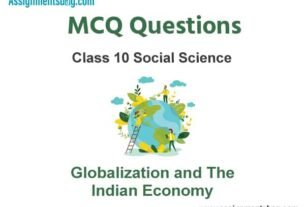Please refer to MCQ Questions Chapter 3 The Making of a Global World Class 10 Science with answers provided below. These multiple-choice questions have been developed based on the latest NCERT book for class 10 Science issued for the current academic year. We have provided MCQ Questions for Class 10 Science for all chapters on our website. Students should learn the objective based questions for Chapter 3 The Making of a Global World in Class 10 Science provided below to get more marks in exams.
Chapter 3 The Making of a Global World MCQ Questions
Please refer to the following Chapter 3 The Making of a Global World MCQ Questions Class 10 Science with solutions for all important topics in the chapter.
Question. The Corn Laws were enacted in Briatin due to the pressure from
(a) poor people
(b) landed groups
(c) farmers
(d) politicians
Answer
B
Question. The Corn Laws were abolished due to the protests from
(a) industrialists and urban dwellers
(b) poors and farmers
(c) politicians and clergies
(d) women and students
Answer
A
Question. Rinderpest into Africa was carried by infected cattle imported from
(a) British Asia
(b) Indochina
(c) England
(d) the US
Answer
A
Question. The technological advancement that led to the availability of meat at affordable cost to poor people in Europe was
(a) advanced kind of slaughtering knives
(b) large iron ships
(c) steam engines
(d) refrigerated ships
Answer
D
Question. The reason that prompted Europeans to colonize Africa was
(a) resources of land and minerals
(b) equable climate conditions
(c) vast pasture land
(d) availability of medicinal plants
Answer
A
Question. Rinderpest that arrived in Africa was
(a) a kind of art
(b) a type of technology
(c) a kind of a pest
(d) a kind of a cattle disease
Answer
D
Question. Rinderpest or the Cattle Plague arrived in Africa in
(a) 1780s
(b) 1790s
(c) 1880s
(d) 1900s
Answer
C
Question. The framework of the post- war international economic system was agreed upon in
(a) July 1944 at Bretton Woods
(b) July 1945 at Bretton Woods
(c) July 1945 at Geneva
(d) July 194 at Geneva
Answer
A
Question. Due to the Great Depression, the prices of raw jute fell by
(a) 40%.
(b) 50%.
(c) 60%.
(d) 70%.
Answer
C
Question. Ceylon and Malaya were the destinations of Indian indentured labour hailing from
(a) Uttar Pradesh.
(b) Bihar.
(c) Tamil Nadu.
(d) Andhra Pradesh.
Answer
C
Question. Recruitment of indentured labour was done by the
(a) plantation owners.
(b) agents.
(c) jobber.
(d) East India Company.
Answer
B
Question. In which Conference were international Monetary Fund and World Bank established ?
(a) Brussels
(b) Bretton Woods
(c) Vienna
(d) Washington
Answer
B
Question. Spaghetti is the western name for
(a) noodle.
(b) pizza.
(c) chopsuey.
(d) chaofan.
Answer
A
Question. In Eastern Europe, America, Russia and Australia food production was expanded to meet the demands of
(a) Britain.
(b) Germany.
(c) France.
(d) India.
Answer
A
Question. Foods like chillies, soya, potato etc., were introduced in Asia and Europe from
(a) Australia.
(b) New Zealand.
(c) America.
(d) Africa.
Answer
C
Question. The smallpox was first brought to America by
(a) Portuguese conquerors.
(b) Spanish conquerors.
(c) Dutch conquerors.
(d) French conquerors.
Answer
B
Question. One who refuses to accept established beliefs and practices is called
(a) atheist.
(b) agnostic.
(c) dissenter.
(d) doubter.
Answer
C
Question. Technological development that helped in transportation of perishable food items to distant places was
(a) refrigerators.
(b) air conditioners.
(c) refrigerated ships.
(d) railways.
Answer
C
Question. Among the three flows, the second flow is that of
(a) labour.
(b) goods.
(c) capital.
(d) services.
Answer
A
Question. Corn laws were imposed in
(a) America.
(b) Britain.
(c) Germany.
(d) France.
Answer
B
Question. Global agricultural economy had taken its shape by
(a) 1900.
(b) 1890.
(c) 1880.
(d) 1870.
Answer
B
Question. Export of an article from India that helped in the recovery of global economy ,as suggested by John Maynard Keynes, was
(a) Cotton.
(b) Jute.
(c) Opium.
(d) Gold.
Answer
D
Question. European settlers in America employed
(a) natives as slaves.
(b) Indians as slaves.
(c) aborigines as slaves.
(d) Africans as slaves.
Answer
D
Question. China’s retreat into isolation resulted in the shifting of the centre of world trade towards the
(a) North.
(b) South.
(c) West.
(d) East.
Answer
C
Question. In India, ‘The Canal Colonies’ emerged in
(a) Haryana.
(b) Uttar Pradesh.
(c) Bengal.
(d) Punjab.
Answer
D
Question. The share of Primary sector in the world trade between 1820 and 1914 was nearly
(a) 50%.
(b) 60%.
(c) 70%.
(d) 80%.
Answer
B
Question. The United States emerged as the colonial power in
(a) 1870s.
(b) 1880s
(c) 1890s.
(d) 1900s
Answer
C
Question. Most Indian indentured workers came from the present day regions of
(a) Eastern Uttar Pradesh.
(b) Punjab.
(c) Delhi.
(d) Haryana.
Answer
A
Question. Livingston was a
(a) sailor.
(b) missionary.
(c) cartographer.
(d) British general.
Answer
B
Question. The team that was sent to search Livingston was headed by
(a) James Widslay.
(b) John Winthorp.
(c) M.W. Ridley.
(d) Sir Henry Morton Stanley.
Answer
D
Question. Smithfield club , the oldest livestock market was located in
(a) America.
(b) Australia.
(c) France.
(d) Britain.
Answer
D
Question. The main beneficiary of the refrigerated ships was
(a) Europe.
(b) America.
(c) Australia.
(d) Asia.
Answer
A
Question. In 1885, to demarcate their respective territories in Africa, the European powers met in
(a) London.
(b) Washington.
(c) Paris.
(d) Berlin.
Answer
D
Question. Stanley was sent to Africa by the
(a) New York Herald.
(b) New York Times.
(c) Illustrated London News.
(d) London Times.
Answer
A
Question. The quickest way of reaching gold fields of Transvaal was by crossing the River of
(a) Nile.
(b) Congo.
(c) Zambezi.
(d) Wilge.
Answer
D
Question. Eritrea is located in
(a) West Africa.
(b) South Africa.
(c) North Africa.
(d) East Africa.
Answer
D
Question. The contracts signed by the indentured labourers of India promised their return after
(a) 3 years.
(b) 5 years.
(c) 7 years.
(d) 9 years.
Answer
B
Question. By 1890s, the contribution of Africa in the world’s gold production was
(a) 50%.
(b) 40%.
(c) 30%.
(d) 20%.
Answer
D
Question. An unexpected problem that was faced by the Europeans in Africa was
(a) inhospitable climate.
(b) shortage of labour.
(c) lack of minerals.
(d) shortage of fertile lands.
Answer
B
Question. The number of the family members, allowed to inherit land as per the new inheritance law was
(a) one.
(b) two.
(c) three.
(d) four.
Answer
A
Question. The groups that forced the government to impose the corn laws were
(a) industrialists.
(b) traders.
(c) entrepreneurs.
(d) landed groups.
Answer
D
Question. The annual Muharram procession was transformed into ‘Hosay’ in
(a) Jamaica.
(b) Caribbean.
(c) Guyana.
(d) Trinidad.
Answer
D

We hope you liked the above provided MCQ Questions Chapter 3 The Making of a Global World Class 10 Science with solutions. If you have any questions please ask us in the comments box below.


